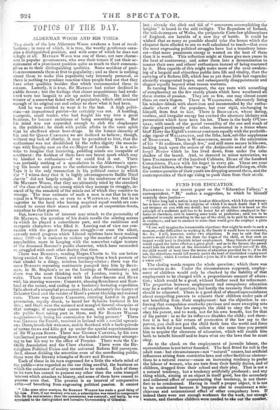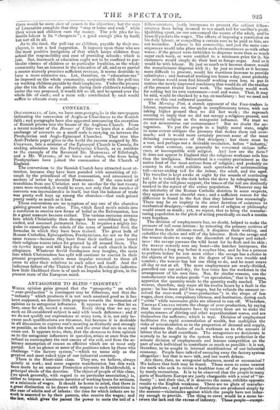FUND FOR EDUCATION.
REFERRING to our recent paper on the "Education Fallacy," a correspondent, "M," makes a suggestion, to which he himself scarcely does justice— "I have long had a notion in my head on this subject, which I do not remem- ber to have met with, but the adoption of which I so much doubt that I will not trespass on you with any detail ; but merely state, that it is based on the principle of a moderate poll-tax to be levied for all children employed in fac- tories or elsewhere, save in learning some trade or profession; such tax to be graduated inversely according to the age of the child, to be paid by the masters or employers, and not to amount to more than would give the employe a plain education.
"I can well imagine the innumerable objections that might be made to such a measure,—the difficulties in working it, the frauds it would have to encounter, &c. &c. I will, however, notice two objections. It may be said that the masters would deduct the tax from the wages of the child, or that such an impost would tend to diminish infant employment. Many friends of humanity would regard the latter effect as a great good: and as to the former, the parent would hire his child out at the diminished wages, or he would not—if he did, the child would at least have the means of education provided for it; if he did not, the objections would fall merely under the head of diminished employment for children ; which I confess I should rejoice in, if it did not open the door for a worse evil."
The closing words reopen the whole question; which there was no occasion to do. Under the circumstances supposed, employ- ment of children would only be checked by the liability of that employment to be charged with a proportionate amount of educa- tion; which would be a good, without further need for refinement. The proportion between employment and compulsory education may be a matter of question ; but hardly the necessity that children should be educated. There is a good deal of absurd squeamishness about compelling parents to educate their children under pain of not benefiting from their employment : but the objection to en- forcing that compulsion overlooks previous and more sweeping acts of compulsion. Our law compels the child to obey the law ; to obey his parent, and to work, not for his own benefit, but for that of his parent : in so far its influence disables the child ; and there- fore it is but a fair return of protection if the law say to the parent, you shall not put the child forth into the world and force him to work for your benefit, unless at the same time you permit him to acquire the elements of education, which will enable him both to benefit himself and to learn what are the laws that he must obey.
As to the check on the employment of juvenile labour, the squeamishness is not better founded. The best fitted for toil is the adult man : but circumstances—not "natural" causes, but artificial influences arising from restrictive laws and other factitious obstruc- tions to a natural course—cause an increasing tendency to prefer the labour of women, who are torn from their family duties, and of children, dragged from their school and their play. That is not a a natural tendency, but a tendency artificially produced ; and any thing which, aiming at an object in itself good, has the secondary and collateral effect of counteracting that tendency, is not there- fore to be condemned. Having in itself a proper object, it is not to be condemned because it happens also to counteract a mis- chievous and unintentional effect of other compulsory laws. If indeed there were not enough workmen for the work, nor enough women, and therefore children were needed to eke out the number,
there would be more show of reason in the objection ; but the men of Lancashire complain that they "stay at home and cook" while their wives and children earn the money. The sole plea for in- fantile labour is its " cheapness "; a good enough plea by itself, but not all in all.
As to the fund, the poll-tax on children, payable by their em- ployers, is not a bad suggestion. It imposes upon those who are the most positive instigators of that which keeps children from school the responsibility and cost of providing schools; which is just. But, inasmuch as education ought not to be confined to par- ticular classes of children or to particular localities, as the whole community has an interest in the education of all, and as so partial a source scarcely promises sufficient revenue, it seems desirable to have a more extensive tax. Let, therefore, an "education-tax" be imposed on the whole community, conjointly with the poll-tax on working children payable by their employers. Under the present plan the tax falls on the parents during their children's tutelage ; under the one proposed, it would fall on all, and be spread over the whole life of each ; and a mere init.1 contributed by each would suffice to educate every soul.



























 Previous page
Previous page